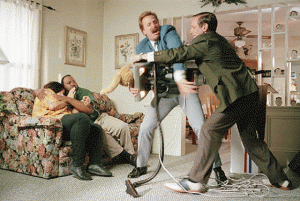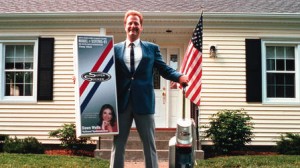From the Chicago Reader (January 24, 2003). — J.R.
Super Sucker
* (Has redeeming facet)
Directed and written by Jeff Daniels
With Daniels, Matt Letscher, Harve Presnell, Dawn Wells, John Seibert, Guy Sanville, Kate Peckham, Sandra Birch, Michelle Mountain, and Will Young.
Super Sucker, the second indie comedy feature written and directed by actor Jeff Daniels, is a terrible movie. But that doesn’t prevent it from being interesting and even admirable as a grassroots phenomenon. I haven’t seen its predecessor, Escanaba in da Moonlight (2001) — based on Daniels’s play, which he produced at his own 160-seat theater in Chelsea, Michigan, the Purple Rose (named after the Woody Allen movie The Purple Rose of Cairo, which Daniels has cited as a turning point in his career). The movie version of Escanaba passed through Chicago at some point and received a listing but not a review in this paper. In fact, Escanaba received few reviews anywhere (although the making of the film was the subject of an article in Harper’s in late 2000). The longest notice appeared in the Detroit News, whose Tom Long wrote that the film “is decidedly a Michigan experience, and there are questions as to how it will fly in lands that know nothing of the Mackinac Bridge, pasties, and the Department of Natural Resources.” But the film’s regional appeal was confirmed by its box office figures for Michigan, Wisconsin, and Minnesota: in those three states alone, the film recouped its $1.8 million production budget and netted a half million dollars to boot.
Super Sucker has little of Escanaba‘s local flavor, but it still bears some of the idiosyncrasies of regional filmmaking, as opposed to slick, standardized Hollywood production. It’s as shamelessly vulgar as the early films of John Waters (Baltimore) and as unrestrained as those of George Romero (Pittsburgh), even if it lacks the thoughtfulness found in the works of regional artists like Victor Nunez (northern Florida) and Guy Maddin (Winnipeg). Although it was rejected by Sundance, it won the audience award for best feature at the U.S. Comedy Arts Festival in Colorado, and stands a fair chance of turning a profit years before it gets seen or reviewed in New York or Los Angeles (if it ever does).
Of course, opening a film in New York is a very expensive undertaking, so it’s hard to figure out why it’s still so widely perceived as a necessary prelude to letting us yokels have a look. The fact that Super Sucker is showing in Chicago is a kind of tribute to the populist character of this city, an acknowledgment of its kinship with the hinterlands and its cultural distance from the coastal capitals. And I admit that there’s something refreshing about having access to a commercial feature that hasn’t yet sought the approval of Elvis Mitchell, Anthony Lane, or Manohla Dargis.
Daniels, who stars in both of his directorial efforts, is a likable, resourceful actor — at least when his capacity for stridency is reined in by the right director. In Super Sucker he plays Fred Barlow, a fanatically enthusiastic door-to-door vacuum cleaner salesman. We never learn the identity of his father, but in a voice-over Fred explains that every summer when he was growing up, he and his mom would eagerly await the Super Sucker sales representative: “He was Santa Claus, Jesus, and the young Elvis all wrapped into one,” he recalls. We never get a clear look at this deity, but we do overhear him humping Fred’s mother, which invites us to surmise that he might be Fred’s missing dad. What’s more, a fleeting close-up of the salesman’s mustached lip seems to intimate that he’s the same guy who later becomes Fred’s archrival, Winslow Schnaebelt (Harve Presnell), a senior salesman who keeps winning Super Sucker sales contests.
The elements of an interesting Oedipal subtext are present, but these hints (if that’s what they are) are never developed, and I was left wondering if the paternity issue was raised inadvertently or if I was picking up on half-buried traces of an early draft of the script. There are other father-son moments between Fred and his inexperienced young protege, Howard (Matt Letscher), but they don’t lead to anything bigger either.
Super Sucker brings to mind several other comedies — Farrelly brothers farces like Dumb and Dumber (which starred Daniels), Bob Balaban’s lesser-known Parents, and Adam Sandler movies like Happy Gilmore and the recent Punch-Drunk Love. A cat swallowed and shredded by a vacuum cleaner is a standard-issue Farrelly hoot; the leering wide-angle close-up is a favorite device of Balaban’s. And the abidingly dopey hero prone to explosions of rage is pure Sandler. But the film’s primary inspiration is clearly Robert Zemeckis’s Used Cars — especially in its celebration of the sleazy maneuvers perpetrated in the name of bloodthirsty professional competition. Zemeckis’s is the better film, thanks to the director’s superior technical proficiency and Rube Goldberg-like gift for articulating complex gags — not to mention the depth, honesty, and consistency of his mean-spiritedness.
The plot of Super Sucker turns on Fred’s discovery that his wife, Bunny (Michelle Mountain), masturbates with an accessory attachment for the 1923 model Super Sucker — the Homemaker’s Little Helper, “designed specifically for your hard-to-reach places.” Soon Fred and his underachieving sales team are promoting the Homemaker’s Little Helper to housewives as a sex toy. The little suckers sell like hotcakes, and the consumer base quickly expands to include some leather-clad gay bikers and a trio of nuns (recurrent anti-Catholic jibes are the movie’s crudest and unfunniest bits). The boost in sales puts Fred’s team ahead of the Schnaebelt squad (who are habitually dressed in loud red uniforms, perhaps as a visual aid to the audience).
Is this meant to be an acerbic commentary on American prudery? On our unhealthy gadget fetishism? Both? Neither? Ultimately this movie doesn’t know and couldn’t care less; it’s simply interested in squeezing out yuks any way it can. That’s a refreshing, even liberating attitude in some respects, but the scattershot approach makes the movie a lot less than it could have been. In one of Super Sucker‘s sharper scenes, Fred — lying next to his wife while she masturbates and moans — philosophizes about autoeroticism as the quintessence of the American pursuit of freedom and happiness. This premise holds some satiric potential, but Daniels doesn’t focus on the metaphor long enough to discover what it might yield. Super Sucker plainly aspires to the condition of satire, and it lunges periodically in that direction, but its humor is too broad and inchoate for it to get there. Daniels too often lapses into jokes and nudges that feel predigested. For instance, Dawn Wells (Mary Ann from Gilligan’s Island) does a cameo as Dawn Wells, a pitchwoman for Super Sucker who vehemently protests the use of her image to promote a sex toy.
Of course, if I’m making this all sound delightfully outrageous, don’t let me stop you from getting sucked in — but don’t say I didn’t warn you either.


